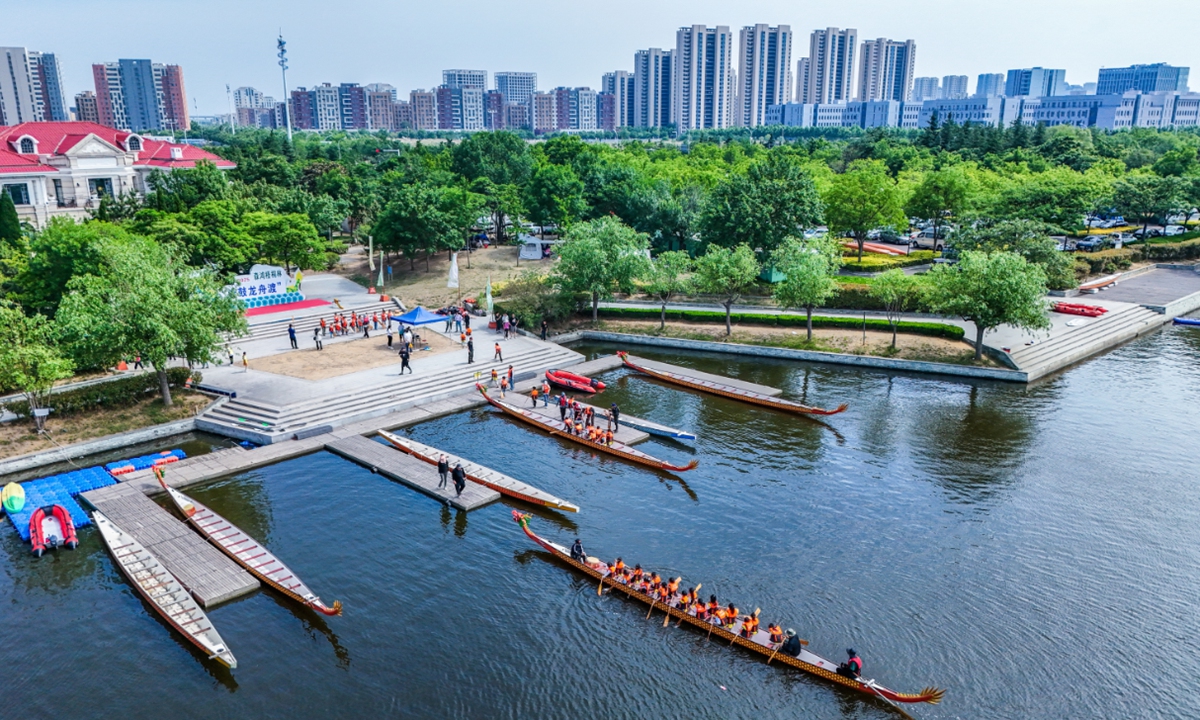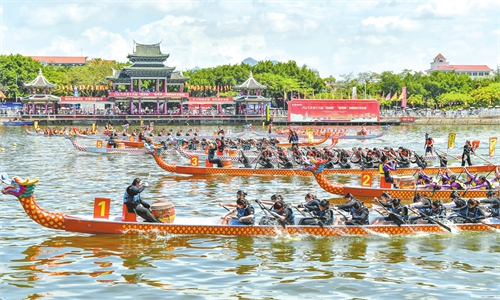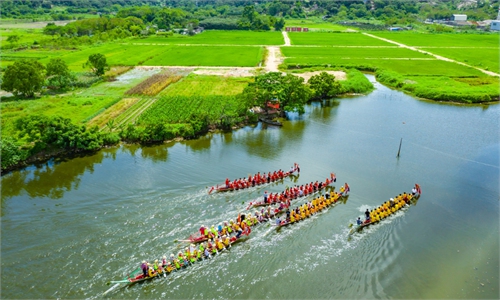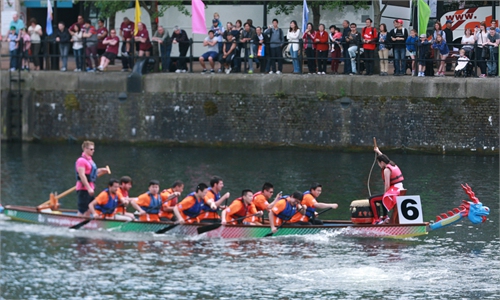ARTS / CULTURE & LEISURE
Dragon boat events fuel holiday cultural tourism across nation
Races serve as ‘magnets attracting visitors’

Children enjoy the fun of dragon boat rowing on a lake in Qingdao, East China's Shandong Province, on June 1, 2025. Photo: VCG
From Foshan, South China's Guangdong Province to northern Chinese cities like the capital Beijing, wide-ranging dragon boat events swept across the country during the 2025 Dragon Boat Festival, fueling the growth of the holiday's cultural experience."The period's tourists surged to more than 50 times the regular volume," He Zhaobin, a cultural tourism expert in Foshan, told the Global Times when describing the city's ballooning tourist numbers during the three-day Dragon Boat Festival holidays (Saturday-Monday). For instance, the Diejiao dragon boat drifting race increased tourism by 90 percent in its region, He said.
Dubbed as "Formula 1 on water," Foshan's Diejiao dragon boat drifting race stands as the most thrilling and iconic event of its kind in China. Crammed with 30-40 paddlers on 25-meter-long boats, the Foshan local dragon boat crews race through narrow canals, making sharp turns under bridges.
This visually spectacular folk competition kicked off on Saturday, the first day of the Dragon Boat Festival holidays, drawing nationwide crowds including visitors from China's Hong Kong and Macao special administrative regions.
"The holidays would lack a sense of ritual if I didn't take my family to watch the dragon boat race," Lam Meiling, a visitor from Hong Kong, told the Global Times.
Including Lam's contribution, He the expert told the Global Times that until June 15, the last day of the 2025 Diejiao dragon boat drifting race, Foshan is expected to host "around 100,000 visitors." He himself is also a racer of the Diejiao dragon boat race.
Beyond Foshan in the South, dragon boat events unfolded nationwide during the festival, each one showing various regional characteristics.
In Yichang, Central China's Hubei Province, the dragon boat race was carried out alongside intertwining memorial events honoring Qu Yuan, a Warring States Period (475BC-221BC) poet born in the region who is a core figure in the festival tradition.
Meanwhile, visitors could watch another dragon boat event in the Baoquan Grand Canyon in Xinxiang, Henan Province, which engaged Chinese and overseas racers from the UK, Russia and Morocco.
Heading to Southwest China, dragon boat events were held in cities like Deyang, Sichuan Province, to show travelers the unique local "duck chasing" folk tradition. Symbolizing prayers for blessings while warding off misfortune, the tradition involves paddlers chasing live ducks across the water.
All the way to the East, a dragon boat cultural festival was held in Jinan, East China's Shandong Province. Carried out on Daming Lake, the traditional competition combined local intangible cultural heritage such as lacquerware art.
Capitalizing on its Grand Canal legacy, the dragon boat carnival in Beijing offered tourists dragon boat performances from both northern and southern China.
These events served as "magnets attracting visitors to further explore a place's Dragon Boat Festival travel packages," cultural tourism expert Liao Huaye told the Global Times.
Taking Beijing as an example, the dragon boat carnival is one of the 1,700 cultural events designed for the holiday break. According to Beijing Municipal Culture and Tourism Bureau, the city has already attracted a total of 2.662 million tourist visits, marking a 7.9 percent of year-on-year increase on the first day of the Dragon Boat Festival holidays.
The Qu Yuan-related dragon boat event in Yichang is also one of Hubei Province's 1,600 cultural touristic programs during the holiday break.
"The dragon boat event is no longer merely a sports competition, but a traditional folk custom inspired by cultural tourism IPs, which shows consumers' preference for experiential folk-culture tourism," Liao told the Global Times.
In 2011, the dragon boat race was made a national intangible cultural heritage. From then on, the traditional sport has grown "much closer to the cultural industry as well as to the public," Liao noted.
"In future, the Diejiao dragon boat drifting race is not going to be the only way for us to attract tourists since we are now developing dragon boat-related creative products and entertainment programs," He, the Foshan dragon boat expert, noted.



